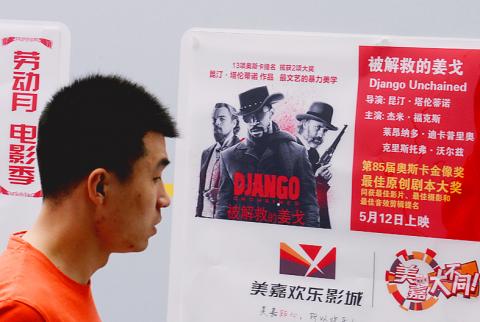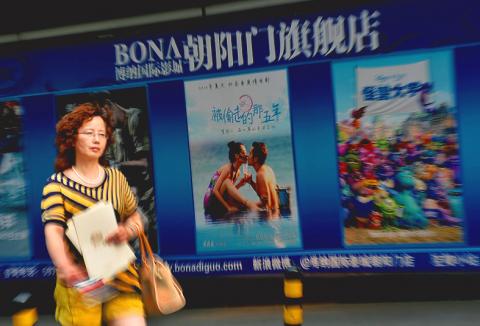Chinese authorities have disrupted an independent film school, shut down two film festivals and harassed organizers of a third in recent months, say independent filmmakers, who see the actions as part of a general clampdown on freedom of expression.
Filmmakers whose edgy themes contrast with the rosier images of the country’s mainstream industry are accustomed to censorship of content deemed to show China in a negative light.
But independent filmmakers say authorities now appear to be trying to chill the sharing and discussion of their films, amid a broader clampdown under Chinese leader Xi Jinping (習近平) on public discourse that could potentially undermine the country’s one-party rule, including the arrests of bloggers who post sensitive material and activists who have accused officials of corruption.

Photo: AFP
“They just want us to make films about food, clothes, entertainment. They don’t want people to think, they don’t want people to have the freedom to express themselves, they don’t want people to have independent and free ideas,” said Yang Lina, an independent documentary maker whose first fictional film — about urban Chinese women — debuted at Rotterdam’s international film festival this year.
“We are upset, but also find it absurd,” Yang said.
Yang was speaking during the Beijing Independent Film Festival that ended Saturday. Police came to last week’s opening and ordered the event cancelled, although organizers kept the festival going by changing some locations and programs, said Wang Hongwei, one of the festival’s creators. He said few people were coming because they didn’t know it was still on or were scared.

Photo: AFP
“They don’t like people with interesting ideas gathering together,” said one of the jurors, Zhen Zhang, a cinema studies professor at New York University.
Other festivals fared worse. In March, the Yunnan Multi-Cultural Festival in southwest China, an influential platform for documentaries, was cancelled. In November, attendees at the 10-year-old China Independent Film Festival in eastern Nanjing were similarly frustrated. Nanjing organizer Wang Fei said the festival’s financial backers withdrew support under pressure from authorities.
Last month, police ordered the closure of China’s only independent film school, the Li Xianting Film School in Beijing, saying that it was “promoting anti-social ideology,” said filmmaker and faculty member Cui Zi’en.
Organizers of the school — set up four years ago because Chinese university film departments consider independent cinema to be a form of dissent — were forced to hold the 40-day course at two other locations, one in a neighboring province and another in an undisclosed part of the capital, Cui said.
Thirty students ranging in age from their 20s to 60s were staying at a hotel in Beijing on the first day of the semester when police and officials from the Industry and Commerce bureau came and told them the school was illegal, Cui said. Police took them to train stations and told them to return home, but teachers later arranged for the students to be taught elsewhere.
“When I heard all the students had been taken away, I thought: ‘How can China become so frightening?’” said Cui, who has made more than 30 films, most shown in the United States and Europe and none in China.
The Public Security Ministry, the Beijing police and the Industry and Commerce bureau did not respond to requests for comment.
Authorities’ targeting of film forums and festivals “is really part of a broader, civil society development that is going on in China,” said David Bandurski, founder of Hong Kong-based Lantern Films and producer of four independent Chinese films.
“It’s not just about films, it’s about activism, it’s about being tied in and participating in social issues and using film as a medium to explore those, so that’s what they are really interested in nipping in the bud,” said Bandurski.
The government has detained at least 55 activists since February in a wide-reaching crackdown on dissent, including ideas such as “Western constitutional democracy” and “universal ideals,” Human Rights Watch said in a report Thursday.
China’s mainstream movie industry is supported by the government, which sees growth potential in the world’s second-biggest film market, but censorship or the expectation of it means films are often confined to safe storylines.
In the 1990s, independent filmmaking was an offshoot of mainstream film culture, but a decade or so later, artists, journalists and academics started exploring digital filmmaking, bringing new themes, such as examining poverty in rural areas or exposing the country’s detention system.
Such films are rarely screened inside China except at small clubs. Some have gained critical acclaim outside China, such as Wang Bing’s 9-hour West of the Tracks, which documents the lives of workers in a decaying industrial area of China. Wang’s latest film, Til Madness Do Us Part, will be shown at the Venice Film Festival next Wednesday. None of Wang’s films have been screened in his own country.
“It’s not that Chinese filmmakers are going to stop making independent films, but it is certainly worrying that these avenues inside China for screening films and for sharing and talking about films have really come under attack,” said Bandurski, also a researcher at the University of Hong Kong’s China Media Project.
Chinese authorities “want to manage and control the perception of China and I think that’s counter-productive,” he said.

Most heroes are remembered for the battles they fought. Taiwan’s Black Bat Squadron is remembered for flying into Chinese airspace 838 times between 1953 and 1967, and for the 148 men whose sacrifice bought the intelligence that kept Taiwan secure. Two-thirds of the squadron died carrying out missions most people wouldn’t learn about for another 40 years. The squadron lost 15 aircraft and 148 crew members over those 14 years, making it the deadliest unit in Taiwan’s military history by casualty rate. They flew at night, often at low altitudes, straight into some of the most heavily defended airspace in Asia.

Many people in Taiwan first learned about universal basic income (UBI) — the idea that the government should provide regular, no-strings-attached payments to each citizen — in 2019. While seeking the Democratic nomination for the 2020 US presidential election, Andrew Yang, a politician of Taiwanese descent, said that, if elected, he’d institute a UBI of US$1,000 per month to “get the economic boot off of people’s throats, allowing them to lift their heads up, breathe, and get excited for the future.” His campaign petered out, but the concept of UBI hasn’t gone away. Throughout the industrialized world, there are fears that

Like much in the world today, theater has experienced major disruptions over the six years since COVID-19. The pandemic, the war in Ukraine and social media have created a new normal of geopolitical and information uncertainty, and the performing arts are not immune to these effects. “Ten years ago people wanted to come to the theater to engage with important issues, but now the Internet allows them to engage with those issues powerfully and immediately,” said Faith Tan, programming director of the Esplanade in Singapore, speaking last week in Japan. “One reaction to unpredictability has been a renewed emphasis on

Taiwan’s democracy is at risk. Be very alarmed. This is not a drill. The current constitutional crisis progressed slowly, then suddenly. Political tensions, partisan hostility and emotions are all running high right when cool heads and calm negotiation are most needed. Oxford defines brinkmanship as: “The art or practice of pursuing a dangerous policy to the limits of safety before stopping, especially in politics.” It says the term comes from a quote from a 1956 Cold War interview with then-American Secretary of State John Foster Dulles, when he said: ‘The ability to get to the verge without getting into the war is